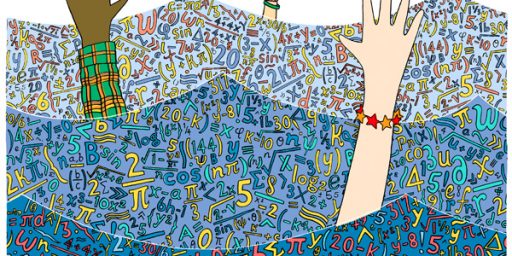Outsourcing Math
Nicholas Kristof starts his column on outsourcing with a math problem that 83% of Japanese seniors and only 30% of their American counterparts can answer.* He then leaps into a defense of free trade but with an odd twist that brings us back to the math problem:
The topic today is the growing furor over the outsourcing of jobs to India — and, more broadly, educational lapses here. One reason for the jobless recovery in the U.S. is that it doesn’t make much sense to have an American radiologist, say, examine your X-ray when it can be done so much more cheaply in New Delhi.
Indeed, why should computer software be written, taxes prepared, pathology specimens examined, financial analysis done or homework graded in the U.S., when all of that can be done more cheaply in Bangalore? I.B.M. is moving thousands of jobs to India and China, and Reuters says it will have Indian reporters cover some U.S. companies from there.
All this is unsettling. But to me the alarm seems overwrought — and dangerous, for it is likely to fuel calls for protectionism. A dozen years ago, there was a similar panic about high-tech jobs going abroad, and people said that Asia would be making computer chips while Americans produced potato chips.
Instead, free trade worked. Some autoworkers lost their jobs, but America emerged stronger than ever. Studies by Catherine Mann of the Institute for International Economics suggest that it is the same this time. Outsourcing raises American productivity, gives our economy a boost, increases foreign demand for U.S. products and leaves us better off.
Yet, as an Indian friend, Sunil Subbakrishna, pointed out to me, there is one step we should take in response to this wave of outsourcing: bolster our second-rate education system.
Mr. Subbakrishna, a management consultant specializing in technology, notes that in his native Bangalore, children learn algebra in elementary school. All in all, he says, the average upper-middle-class child in Bangalore finishes elementary school with a better grounding in math and science than the average kid in the U.S.
***
The broader problem is not just in schools but society as a whole: There’s a tendency in U.S. intellectual circles to value the humanities but not the sciences. Anyone who doesn’t nod sagely at the mention of Plato’s cave is dismissed as barely civilized, while it’s no blemish to be ignorant of statistics, probability and genetics. If we’re going to revere Plato, as we should, we should also remember that his academy supposedly had a sign at the entrance: “Let no one ignorant of geometry enter here.”
In 1957, the Soviet launching of Sputnik frightened America into substantially improving math and science education. I’m hoping that the loss of jobs in medicine and computers to India and elsewhere will again jolt us into bolstering our own teaching of math and science.
I agree with Kristoff on both the generally beneficial effects of free trade and of the need to improve our education system, including our grounding in math and science. I will note that this is not a universal problem, though. My understanding is that the local schools here in Loudoun County, Virginia in fact do teach algebra in elemetary school and even teach calculus rather early on. (By contrast, I didn’t have calculus until college and had algebra in 9th grade.)
As a former poli-sci prof, though, I’m rather amused by the assertion that the society values the ability to debate political philosophy more than scientific skills, however. One has only to look at the comparative paychecks of the average social scientist compared to that of the average engineer, computer industry manager, or skilled tradesman to know different. This phenomenon is likely limited to journalism circles.
*I must confess I couldn’t solve the problem either. For one thing, I haven’t had any contact with symbolic algebra in over 15 years. And either the notations have changed or I’ve simply forgotten what some of the symbols are. The lead squiggle means nothing to me and, since there is no “d” on the left side of the equation nor in any of the supplied answers, I can only assume that it isn’t actually the letter “d” but another symbol with which I’m unfamiliar.






It’s an integral sign.
But the question is still pretty dumb since it requires you to expand all of the possible answers to see if they match.
Huh? If you’ve taken a course in integrals (usually 2nd year calculus) you should know the answer immediately.
If not, you will never know.
Which, of course, makes it a stupid test as well.
OK–I had that in calculus. Sadly, I remember not a whit of what was taught in the two semesters of calculus I took as an undergrad.
“As a former poli-sci prof, though, I’m rather amused by the assertion that the society values the ability to debate political philosophy more than scientific skills, however.”
I know a lot of people from a lot of walks in life. When push comes to shove, I dont’ know anyone who values the ability to debate political philosophy more than the ability to unplug a drain, make a potato gun from scratch, grow a 60 bushel crop of wheat, turn a family business into a major employer, drop a puck in the net behind two defensemen while playing shorthanded….
In short, for the overwhelming majority of ordinary citizens, political philosophy is a curiosity that rises in the pre-election season – and one that they spend very little time thinking about.
Kevin is of course a product of California schools.
Of course, the assertion that we devalue math and science is absurd. No one is so quick to point out the superiority of math and science training than math and science majors, engineers and computer tech types (cf. Dean Esmay’s post on college education). But math and science are definitely harder to master than writing, expounding on politics, examining the hegemony of 19th century male europeans, or for that matter, putting a round ball through a basket suspended 10 feet off the floor.
And if we’re comparing “devalued” areas, I think math science and humanities are all devalued compared to the ability to act stupid on cue, rhyme very quickly, and perform various feats of athletic ability.
bryan,
Agreed on paragraph 2. Not so sure, though, that math skills are harder to master than writing, etc. For me that’s certainly true. But the 50th percentile on the math SAT is a much higher number than the 50th percentile on the verbal.
Show of hands: How many of you have used calculus since you graduated from high school? I hadn’t and thus was startled when I got the question right. (For the record, I made a 1 on the AP Calc test. 1. You get 1 for signing your name.) Calc wasn’t required to graduate from my high school.
I am increasingly annoyed by how we Gen Xers are so damn stupid because, apparently, we didn’t learn anything, and the Gen Ys below us learned even less. We did the best we could with the crap public education system you guys paid for. Also, there’s the issue of European and Asian school systems kicking the bottom half of their enrollment into vocational school. Do those kids ever get asked about integrals? Hell no. Yet there’s an expectation that even lowliest of kids should be able to take the integral of a polynomial, even though they’re never going to use it.
And while we’re at it, I haven’t taken the integral of a polynomial in nearly 15 years, but every single day I write — and I’m confronted by people who CAN’T write. I get cover letters and resumes that aren’t proofread, contain major word usage errors, are terribly formatted, and generally read like someone who spent so much damn time filling in bubbles they never learned how to write a clear and cogent persuasive paragraph. Yet, we’re barely testing on that. (And the amazing thing is that American kids can probably still write the rest of the world under the table in English, and probably always will be able to.)
There was a movement briefly in Washington state that would require all candidates for statewide office to take the WASL, the new high school exit exam required by No Child Left Uneducated As To How To Fill In A Bubble Sheet, and have their score published in the voters pamphlet. It didn’t make it far, and that’s a shame, because I’m willing to bet that the failure rate for 40-50-60 yo adults would be twice as high as it would be for 16yo kids.
dw,
Likely so.
Indeed, I’m sure I would do far worse on the math section of the SAT now than I did as a high school sophomore, simply because it’s been so long since I’ve seen that material.
As I noted in a post yesterday, the value of the education process is often the process itself. I think the math classes helped me–but I didn’t actually learn what it is they were teaching.
“Show of hands: How many of you have used calculus since you graduated from high school?”
Are you kidding? That’s one of the perks of dating an engineer; math problems go to her and I get the “Wouldn’t It Be Interesting / Cool / Odd / Whatever If X Happened” questions. It all works out.